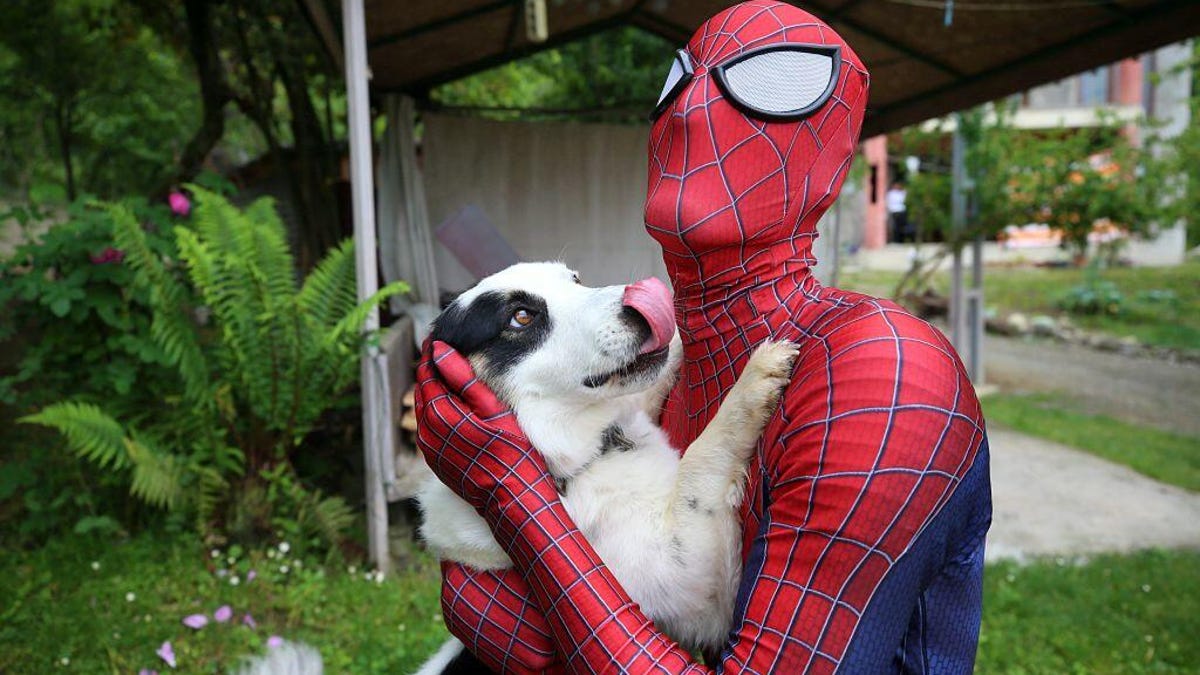San Diego Comic-Con: Which superhero is most neurotic? Writers weigh in
Even caped (and uncaped) crusaders get the blues.

Maybe an emotional-support pup could help Spidey lick the stress.
The superhero-verse is chock-full of neurotic characters, from a guilt-ridden Captain America to an alcoholic Tony Stark to a self-absorbed Dr. Strange. But who nabs the unwanted prize for the most neurotic superhero? For the comic book experts at a San Diego Comic-Con panel on Friday, the answer was clear.
Spider-Man, who dealt with guilt and shame after the death of his uncle, has become the "poster boy for the neurotic superhero," according to Travis Langley, a speaker during Neurotic Superheroes and the Writers Who Love Them at SDCC 2021. Langley, author of nonfiction books such as Batman and Psychology, echoed panelist Danny Fingeroth, who said the honor obviously went to Spidey.
"Spoiler alert, (it's) Spider-Man, no surprise," said Fingeroth, who was the longtime group editor of Marvel's Spider-Man line of comics. "He had it built into his origin."
The panelists from Neurotic Superheroes and the Writers Who Love Them. Top row: Travis Langley, Danny Fingeroth, Louise Simonson. Bottom row: Bryan Q. Miller, Brian Michael Bendis, Marv Wolfman.
SDCC went online last year amid the coronavirus pandemic and continued the format this year, offering free online panels Friday on topics such as the Fear Street Trilogy, Rick and Morty and this talk fest, where comic book writers and editors gathered to discuss neurotic heroes.
Panelist Marv Wolfman, creator of The New Teen Titans comics, added that the young age of Peter Parker (aka Spider-Man's secret identity) could've contributed to his neurosis.
"He's going to assume that he's the one who screwed up," Wolfman said. "It comes with how young he is, where he totally feels that he's always being put down. It's his fault; it's his problem."
Neurosis is a mild mental illness that involves symptoms of stress but doesn't make people lose their grip on reality. Langley said a definition of neurotic behavior could be when a person poorly uses anti-stress defense mechanisms. "Either they're using them too much, like constant denial, refusing to admit anything to themselves, or they're not using them enough to protect themselves from stress," he said.
The panelists who wrote comics were quick to admit they played out their own problems in the superhero characters they crafted.
"It's really hard to not have your stuff flow through that person, because you're like, 'If I was in that situation, what would I do?'" said Bryan Q. Miller, who was a writer for the Superman TV show Smallville and worked on DC's Batgirl comics. "You can parse that out and make the character behave differently, but there's some element to those stories that has something to do with your own worldview or personal experience or neurosis."
Langley said that in the '60s, Marvel started bringing neurotic characters to life one after the other, which was different from what people were used to from the comics. It began with The Fantastic Four in 1961, when Stan Lee "redefined comics by founding a team that struggled with recognizable issues," Marvel writes. Then there was Captain America, who reckoned with guilt after the loss of his friend Bucky, then Iron Man and Dr. Strange, who both lugged big egos.
Louise Simonson, who's worked on the comic books Power Pack, X Factor, The New Mutants, Steel and Superman: The Man of Steel, said she loves to write neurotic superheroes.
"If your characters are having a happy life where they're just joyous all day long, you get bored with them really fast," Simonson said.
She said she thinks putting characters in difficult situations keeps the comic book reader invested. Other panelists, including Fingeroth and DC comic book writer Brian Michael Bendis, agreed.
"I always thought our job was to get people to be so mad at us, that they would have to see every issue to see how we were screwing up," Fingeroth said. Added Bendis, "(Comics writer) Greg Rucka said the best compliment you can get is when a fan reaches out to you (and says), 'Why do you hate this character?!' That means you're doing right by them."

